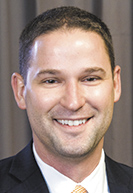Subscriber Benefit
As a subscriber you can listen to articles at work, in the car, or while you work out. Subscribe NowThe do-over nature of Marion County’s small claims courts is about to change, which legal aid attorneys say will be beneficial for litigants and could help foster new and much-needed caselaw in the areas of housing and debt collection.
On July 1, the small claims courts in Indiana’s most populous county are going to become courts of record. Like the small claims courts in the state’s 91 other counties, Marion County’s proceedings will be recorded and any appeals will go straight to the Indiana Court of Appeals.
 Chaudhary
Chaudhary“We think on the balance, this is a positive change,” said Jay Chaudhary, managing attorney at Indiana Legal Services. “We’re cautiously optimistic this will be good for our clients because of the openness that it will provide to the proceedings.”
The transition to becoming courts of record was among the recommendations made in 2012 by the Small Claims Task Force, led by Court of Appeals Judge John Baker and Senior Judge Betty Barteau. It was then folded into a bill passed by the 2015 Indiana General Assembly, reforming the Marion County small claims courts.
Sen. R. Michael Young, the author of Senate Enrolled Act 523, included a provision that delayed for three years the move to becoming courts of record. The Indianapolis Republican gave the Marion County small claims courts time to install the equipment and make the other necessary preparations, such as amending local rules.
 Laramore
Laramore Lynch
LynchMarion Circuit Judge Sheryl Lynch has been working closely with the Marion County small claims judges and guiding the transition. She called the change “a win for everyone,” noting that having a record will enable disagreements over what happened in court to be quickly resolved.
At Indiana Legal Services, executive director Jon Laramore said litigants and attorneys will have to remember to preserve objections and evidence for any possible appeal. But other than that, he does not foresee the change having a direct impact on his agency’s day-to-day operations.
“I think it’s just a change that everyone involved in small claims proceedings needs to be ready for and address,” he said.
Potential for caselaw
Presently, what happens in Marion County small claims courts stays there. The dialogue from the litigants and inquiries from the judge are not in any way preserved. When a decision is appealed, the case goes to Marion Superior Court, where the entire process starts anew.
With no record to build upon, the small claims judgments are vacated and the litigants must start from scratch. They have to file complaints, responses and motions with the court, and they usually have to take on the expense of hiring an attorney for representation.
The change will put recording microphones in the small claims courtrooms in the nine townships in Marion County to capture the proceedings and create a record. Any rulings that are appealed will leap to the appellate level, where the record from small claims will become the foundation of the arguments.
Baker does not expect the transition to have much impact on the Court of Appeals. Already the number of appeals coming from the small claims courts outside of Marion County is “very insignificant,” he said, and even though Marion County small claims courts do have a tremendous caseload, he does not anticipate seeing many more such disputes.
 Haller
HallerHowever, Chase Haller, housing attorney at the Neighborhood Christian Legal Clinic, sees the potential for a higher volume of small claims cases to reach the appeals court.
As a result, the need for appellate attorneys to provide pro bono assistance could increase. Haller said legal aid nonprofits may not only have to adjust their intake process to handle individuals who want to appeal a small claims ruling, but also will have to start building a network of lawyers who regularly practice in the appellate courts.
“I believe that legal services organizations will need to focus on fostering relationships with attorneys experienced with appellate litigation to ensure that we identify and pursue matters on behalf of low-income clients,” Haller said. “Otherwise, there remains the risk that they will be outmatched at the appellate stage of the litigation.”
The uptick in appeals could also provide more opportunities for caselaw to be created regarding small claims matters, Haller said. Currently, only a few appellate decisions govern landlord-tenant issues, and those are several years old. But with appeals of evictions or rent-to-own agreements, a ruling would have the possibility of helping individuals and families across the state secure stable housing.
“On the balance it’s positive mainly because I’ve heard a lot of anecdotes about the process being abused and hurting pro se tenants,” Haller said of the court of record transition. “This (change) is helpful.”
Reforming the courts
The importance of having a record was underscored in the October 2017 decision in Dyamond Harris v. Lafayette LIHTC, LP, 79A02-1703-SC-638.
Harris successfully appealed the small claims ruling against her for nonpayment of $38 in rent. In reviewing the record, the appellate panel found the landlord had mischaracterized to the Court of Appeals what had actually happened in small claims. Also, the panel ruled Tippecanoe Superior Judge Laura Zeman had violated Harris’ due process rights by berating and belittling her for living in subsidized housing.
Marion County small claims courts have been in the spotlight since the Wall Street Journal in 2011 detailed forum shopping and unfair collection practices. The Baker-Barteau task force was followed by the National Center for State Courts doing a study in 2014 and drawing much the same conclusions.
More fuel was added to the fire when, also in 2014, the 7th Circuit Court of Appeals issued its en banc decision in Suesz v. Med-1 Solutions, LLC, 13-1821. The majority ruled debt collection could only be filed in the Marion County small claims jurisdictions either where the defendant lived or where the debt had been incurred.
Retired Marion Circuit Judge Louis Rosenberg started reforming the Marion County small claims courts after Baker and Barteau finished their report. Lynch, then a commissioner, assisted Rosenberg. When she became judge in 2015, she spent time in the Statehouse to help with Young’s bill and has since met monthly with the small claims judges to craft uniform practices and procedures.
“This is just so inspiring,” Lynch said of the collaboration of the small claims judges. “It’s been thrilling to see how far they’ve come in three years.”
The circuit court must issue the new administrative rules for the small claims courts since they are becoming courts of record. Lynch said she began drafting the rules with former Indiana Supreme Court Chief Administrative Office Mary Willis in February.
Although the redrafted rules must be posted at least 30 days before the change, Lynch does not expect they will create much public consternation. She said the rules contain nothing new. They are just reflecting what the law says and follow what the other small claims courts are doing.
 Baker
BakerBaker is not concerned that the more informal rules of evidence typically followed by small claims courts will cause any hiccups for litigants who take their cases to the Court of Appeals. He noted the appellate court has been reviewing cases from the small claims courts in the other 91 counties and is accustomed to managing the different evidentiary standard.
A former small claims judge in Bloomington, Baker maintains most people go to court for either traffic infractions, small claims or divorces, and their image of the entire judicial system depends on how they are treated in those courtrooms. He, like Lynch, is proud of the work the Marion County small claims judges have done to improve their courts for the litigants, and he is now eyeing a new goal.
“Before my career ends,” Baker said, “I want Marion County small claims courts to be the standard against which all small claims courts are judged.”•
Please enable JavaScript to view this content.
